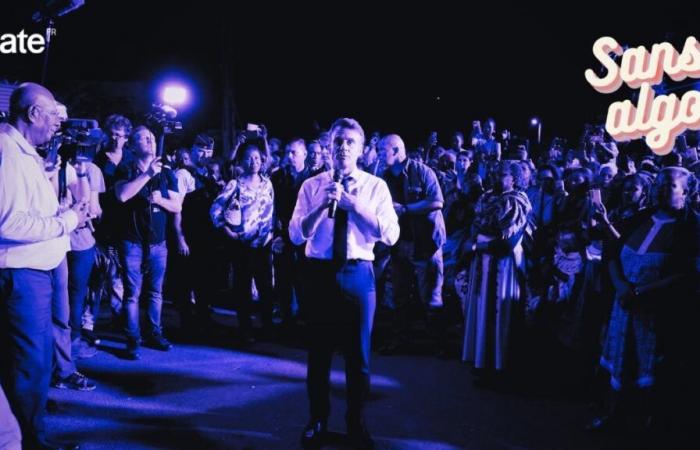Saturday December 14, Cyclone Chido devastated Mayotte. As chance would have it, this natural disaster occurred the day after the appointment of the new Prime Minister François Bayrou, who was too busy forming a government (and attending the Pau municipal council) to go to the 101e French department. Only Bruno Retailleau and François-Noël Buffet, resigned ministers of the Interior and Overseas Territories, jumped on a plane to assure the Mahorais that the State had not forgotten them.
In the days that followed, the inhabitants of the island received a visit from the President of the Republic and his remarks considered inappropriate (“If it wasn’t France, you would be 10,000 times more in trouble!”). Then, finally, that of the Prime Minister and five members of the government who came to announce the “Mayotte standing” plan to rebuild the island in two years. François Bayrou also set the start of the school year for January 13 despite the destruction of most schools, proposing a “temporary schooling” students who wish to do so in France (a little less than 8,000 kilometers from home).
Subscribe for free to Sans Algo to receive our podcast and culture recosMatilde Meslin's newsletter, every 15 days in your mailbox.
The interministerial visit of less than twenty-four hours was above all marked by an image: that of the Minister of National Education Elisabeth Borne turning her back on two teachers who had come to alert her about insufficient food distributions. One failure among many others, which raises the question: why is the political class struggling to provide answers to the problems of the French Overseas Territories?
To understand it, you have to listen to the excellent series of The Magnifying Glassthe current affairs podcast from L’Express, entitled “Mal d’Outre-mer”. Published a few weeks before Cyclone Chido hit Mayotte, it analyzes in four episodes the difficult relationship of the French State with the French Overseas Territories. After having mentioned the tumultuous history between the metropolis and New Caledonia in the first part, the journalist Charlotte Barris looks at the Mahorais case in the second, by interviewing Alexandra Saviana, journalist, and Hugues Tertrais, historian and former president of the French Overseas History Society.
Together, they recall the precarious economic, demographic and health reality of the island: population living mainly below the poverty line, cholera epidemic at the start of 2024, massive illegal immigration from the Comoros archipelago, unsanitary shanty towns, social minimums lower than everywhere else in France, etc. It's hard to believe that what the journalists are describing is a French department, as the state seems so powerless. The podcast also details the multiple exceptional legal measures taken by the latter, including the questioning of land rights in Mayotte, which makes it a “laboratory” for an anti-immigration policy.
The rest of the series does not focus on a particular territory, but rather questions France's policy towards its overseas territories in general. The third part, devoted to the role of Minister of Overseas Territories, is particularly interesting. He explains how this position, occupied by no less than nine ministers since the election of Emmanuel Macron in 2017, is a sort of mission impossible for anyone occupying it, as the files are complex and the resources limited. Journalists go so far as to describe him as “worst government job”.
After listening to this podcast, we can only question the centralization of power in Paris, especially when dealing with specific issues in territories located thousands of kilometers from France. Perhaps a little more than elsewhere, overseas citizens feel misunderstood (or even despised) by the government. And who benefits? The National Rally!
In the last part of the podcast, Charlotte Barris explains how Marine Le Pen seduces overseas voters thanks to economic arguments that hit the mark in these French territories, which are often poorer than in mainland France and plagued by the high cost of living. According to the Competition Authority, the cost of living in overseas territories is on average 19 to 38% higher than in France. In 2022, the far-right party came first in the French Overseas Territories (just behind abstention) in the presidential election. If the political class continues to fail to establish a dialogue with the overseas, there is no doubt that in 2027, the latter will vote even more massively for the RN.
Other works to read, see, listen to
- To understand the geopolitical link that unites Mayotte to the French metropolis since the 19th centurye century, you have to watch this short video from Lumni, the public service educational platform. It explains in particular why Mayotte became a French department, while the rest of the Comoros archipelago obtained its independence. If you prefer audio, Benjamin Brillaud released an episode of the podcast Please note which explains pretty much the same thing.
- Mayotte is thirsty and Cyclone Chido is not the only one responsible. For years, the island has been experiencing a very serious water crisis. Clémentine Lehuger already told it on the Slate website in November 2023.
- By listening The Magnifying GlassI discovered an event from 1987 that I had never heard of: the prevented landing of Jean-Marie Le Pen in Martinique, barred from accessing the tarmac by thousands of anti-racist and anti-fascist activists. The Martinique – La 1ère site sums it up brilliantly thanks to archives from the time, which contrast with the images of Marine Le Pen visiting Mayotte in April 2024.






